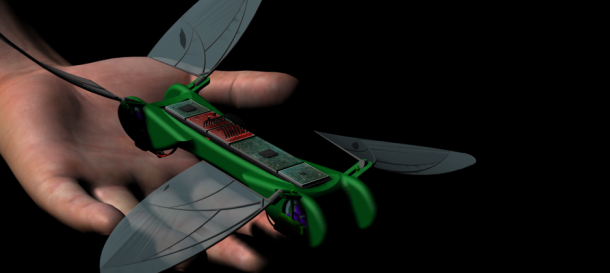
Robohub.org
Robotic dragonflies take to the sky (with your help)

Is it a bird? Is it a plane? No, it’s the Robot Dragonfly from TechJect. Developed over four years by researchers at the Georgia Institute of Technology for the US Air Force, the researchers are now investigating commercial and consumer opportunities through their recently released campaign on the crowd-funding website, IndieGoGo.
True consumer (as opposed to military or hobbyist) UAV’s first truly “took to the skies” with the release of Parrot’s iPhone-controlled AR.Drone in 2010, which has, for the last two years, been relatively unchallenged. Now, with the help of crowd-sourced funding, new takes on consumer UAVs are emerging, some more playful, and some more hobbyist oriented.
Few however are as innovative as the Robot Dragonfly, whose patented and bio-inspired drive/flight system gives it the ability to hover like a helicopter, and dynamically switch to a “gliding mode”, more like a conventional fixed-wing craft. As with all crowd-sourced campaigns, the Robot Dragonfly is not yet a finished or proven product, however if product simulations and current prototypes are to be believed (both shown in following video), its four wings and light weight (25g) should offer an interesting array of dynamic movements and flight possibilities not achievable with conventional UAV designs.
The following promotional video was released by the group along with the crowd-funding campaign. This video gives an overview of the Robot Dragonfly’s development at the Georgia Institute of Technology, takes a look at the existing research prototypes and shows simulations of the final version performing in a number of different situations.
The group are targeting a broad range of markets with their initial release and have suggested applications in Augmented-Reality Gaming, Aerial Photography, Telepresence, Personal and Commercial Security, and in the Military. For more information, see the Robot Dragonfly IndieGoGo campaign, where team-members are actively answering questions and responding to suggestions.
tags: consumer, crowdfunding, entertainment, Flying, Georgia Tech, Kickstarter, military, Parrot, robot funding, robot startups, UAV, video



